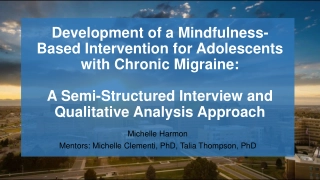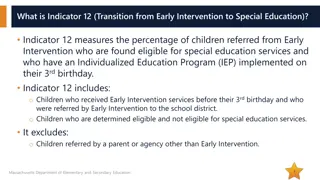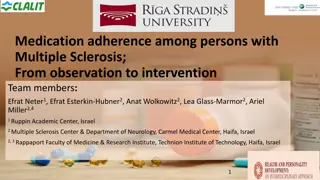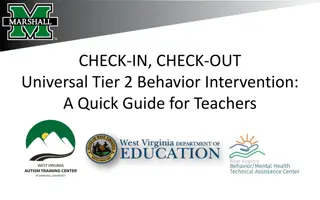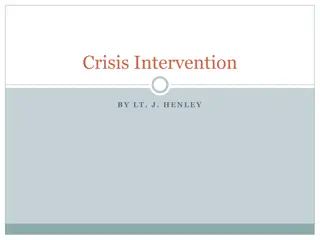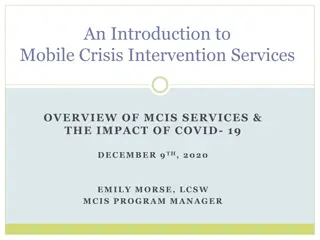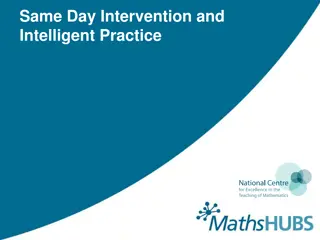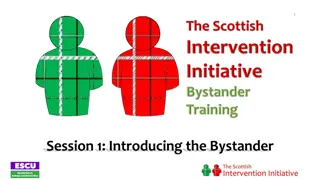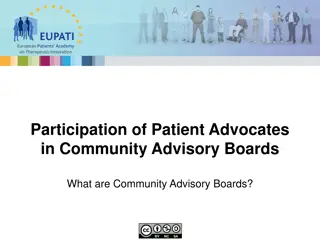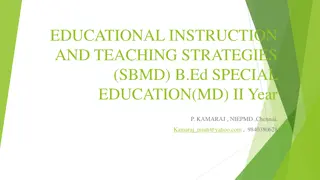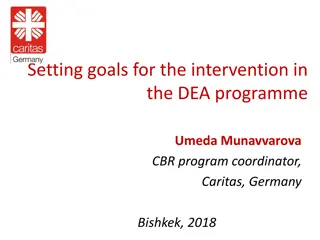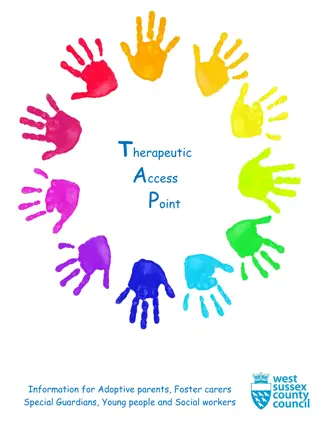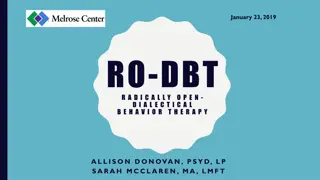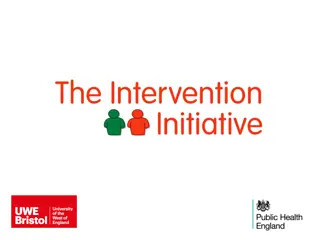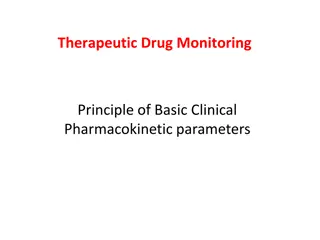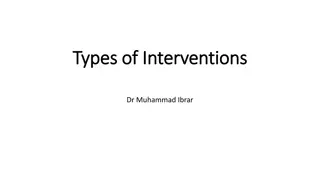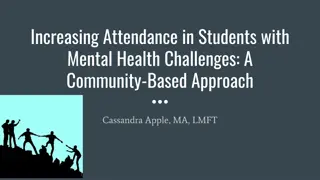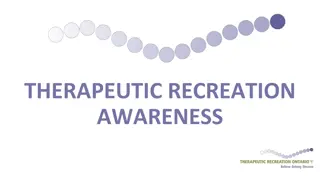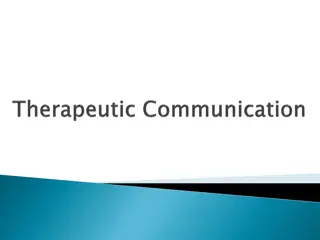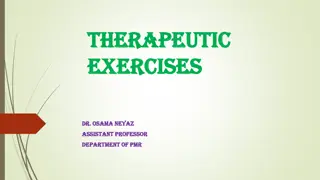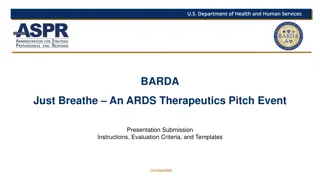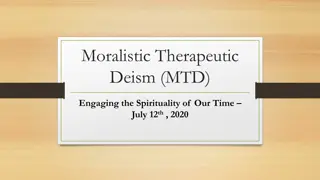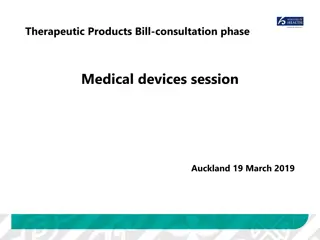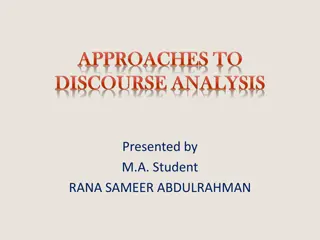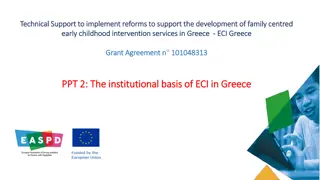Mindfulness-Based Intervention for Adolescents with Chronic Migraine: Qualitative Study
This study focuses on developing a mindfulness-based intervention for adolescents with chronic migraine, aiming to address the lack of effective treatments. Through remote interviews and qualitative analysis, stakeholders' experiences and feedback are being gathered to adapt the intervention. The re
0 views • 15 slides
Social Network-Based Intervention Improves HIV Testing and Linkage Among Fishermen in Kenya
In sub-Saharan Africa, a study was conducted among Lake Victoria fishermen in Kenya to assess the effectiveness of a social network-based intervention in improving HIV testing and linkage outcomes. Results showed significantly higher rates of HIV self-testing and linkage to health facilities in the
0 views • 19 slides
Complex SFA CTO Intervention Live Case Study - 11/29/2023
A 72-year-old gentleman with severe RLE claudication referred for evaluation. Despite medical therapy, he experiences rest pain. Past medical history includes diabetes, hypertension, hyperlipidemia, hypothyroidism, and prior PAD intervention. The case details the patient's presentation, vital signs,
1 views • 5 slides
Understanding Indicator 12: Transition from Early Intervention to Special Education
Indicator 12 measures the successful transition of children from Early Intervention to Special Education by evaluating the percentage of children referred from Early Intervention who are found eligible for special education services and have an Individualized Education Program (IEP) in place by thei
1 views • 6 slides
Routines-Based Intervention for Early Childhood Home Visiting
Learn about the Routines-Based Intervention for Early Childhood Home Visiting by Robin McWilliam from the Evidence-based International Early Intervention Office. Explore how children learn, service decision-making, support provision, and evaluation. Understand the importance of needs assessment, eng
0 views • 34 slides
Enhancing Medication Adherence in Multiple Sclerosis Patients
This study explores medication adherence among individuals with Multiple Sclerosis (MS), presenting insights from observation to intervention stages. It delves into the background of MS, adherence, Disease-Modifying Therapies (DMTs), and the challenges faced. The team identifies reasons for non-adhe
0 views • 41 slides
Comprehensive Guide to Check-In, Check-Out Universal Tier 2 Behavior Intervention for Teachers
Explore the Check-In, Check-Out Universal Tier 2 Behavior Intervention designed to provide structure, accountability, and feedback to students, improving behavior and academic success. Discover how it creates a strong home-school connection and is tailored for students not meeting Tier 1 expectation
0 views • 18 slides
Understanding Crisis Intervention and CIT in Corrections
Explore the concept of crisis intervention, the history of Crisis Intervention Teams (CIT), and the application of CIT principles in prison settings. Learn about the nature of crises, symptoms, and stages, with a focus on referring inmates to mental health services and enhancing safety within correc
2 views • 23 slides
Overview of Mobile Crisis Intervention Services and the Impact of COVID-19
Mobile Crisis Intervention Services (MCIS) in Connecticut provides crisis stabilization and hospital diversion for youth experiencing behavioral and mental health crises. Available for ages 0-17 and 18-year-olds in high school, MCIS offers intervention, referrals, and support to prevent future crise
0 views • 17 slides
Enhancing Learning Through Same-Day Intervention and Intelligent Practice
Efforts are made to ensure students keep up with lessons through same-day intervention, providing support for those who require additional assistance. Intelligent practice methods are employed to reinforce learning, engaging students in reasoning activities. Various models of same-day intervention a
0 views • 7 slides
Understanding Bystander Intervention in Sensitive Situations
Learn about the role of a bystander in sensitive situations, including types of bystanders and how to intervene effectively. Explore scenarios and factors affecting intervention and non-intervention, emphasizing the importance of noticing, interpreting, feeling responsible, and possessing necessary
1 views • 20 slides
Understanding Community Advisory Boards in Patient Advocacy
Community Advisory Boards (CABs) play a crucial role in connecting patient advocates with researchers in the field of therapeutic innovation. They review clinical trial protocols, monitor trials, and educate the community. CABs can be established for specific purposes or therapeutic areas. Different
0 views • 15 slides
Early Intervention and Teaching Strategies in Special Education
Early Intervention in Special Education involves promoting the development of children with delays or disabilities through a system of services focusing on various skills like language, cognition, and social interaction. Understanding brain plasticity, gene-environment interaction, and the importanc
1 views • 19 slides
Understanding Mistakes, Disruptures, and Enactments in Therapeutic Relationships
Exploring the interconnected nature of mistakes, disruptures, and enactments in therapeutic relationships, with a focus on the impact of errors on the therapeutic process and the potential for growth and repair within the relational context. Various models and approaches in psychotherapy are discuss
0 views • 25 slides
Intervention Boosting Self-Efficacy Among Adolescents Challenging Discrimination
Adolescents challenging discrimination through a perspective-taking and action-planning intervention showed increased self-efficacy, particularly among White participants. The intervention, which included facilitated discussion sessions, led to positive outcomes and highlighted the importance of bys
0 views • 7 slides
Boosting Self-Efficacy in Adolescents: Intervention Study
Adolescents challenged discrimination through a perspective-taking and action-planning intervention, leading to increased self-efficacy, especially among White participants. The intervention involved facilitated discussions, self-disclosure, and sharing experiences to empower adolescents to interven
0 views • 7 slides
Effective Intervention Planning for Rehabilitation Services
The intervention in the DEA programme involves a thorough assessment of user needs, formulation of objectives, and planning based on case management technology. The cycle includes assessment, planning, and actual intervention. Prioritizing high-priority problems is essential for effective outcomes.
1 views • 13 slides
Therapeutic Products Bill Consultation Phase: Summary of Purpose and Design
The Therapeutic Products Bill consultation phase in Auckland discussed the purpose and design of the Act to ensure safety, quality, and efficacy of therapeutic products. The team included key advisors from MoH, guiding principles emphasized benefits outweighing risks, and a framework for regulation
0 views • 38 slides
Law Enforcement's Response to Mental Health Crisis Intervention
Law enforcement agencies have established Emotionally Disturbed Persons Response Teams (EDPRT) and Crisis Intervention Teams (CIT) to address mental health crises in the community. These specially trained officers handle situations involving emotionally disturbed individuals, suicidal persons, psych
0 views • 13 slides
Understanding the Therapeutic Access Point (TAP) for Child Welfare Professionals
The Therapeutic Access Point (TAP) is a crucial multi-disciplinary meeting for determining appropriate therapeutic interventions for children in care. Referrals are made through a structured process, and various professionals, along with parents and carers, attend to discuss the child's needs. TAP i
1 views • 6 slides
Understanding RO-DBT: A Therapeutic Approach for Overcontrolled Clients
Develop a comprehensive understanding of Radically Open Dialectical Behavior Therapy (RO-DBT), a therapeutic approach created by Dr. Thomas Lynch for patients not benefiting from traditional DBT. RO-DBT focuses on enhancing receptivity, openness, flexible control, intimacy, and connectedness in over
0 views • 24 slides
Understanding Bystander Intervention in Social Norms Discussion
Explore the dynamics of bystander intervention in social norms discussions, highlighting the importance of noticing, interpreting, feeling responsible, and possessing necessary skills to act. Learn through real-life scenarios and discussion questions to understand when and how intervention can occur
1 views • 19 slides
Understanding Therapeutic Drug Monitoring and Clinical Pharmacokinetic Parameters
Therapeutic Drug Monitoring (TDM) utilizes pharmacokinetic principles to optimize drug therapy by balancing efficacy and toxicity levels. Historical background reveals a shift from empirical dosing to precise pharmacokinetic analysis, aiming to minimize toxicity risks and maximize therapeutic benefi
0 views • 47 slides
Different Types of Interventions to Address Addiction Challenges
Every individual's addiction story is unique, requiring different types of interventions tailored to their specific needs. This article explores four popular intervention approaches - simple intervention, classical intervention, family system intervention, and crisis intervention - each designed to
1 views • 7 slides
Comprehensive Therapeutic Pilates and Physiotherapy Services by Héctor J. García Umpirrez
Offering a wide range of specialized services including therapeutic Pilates, physiotherapy, medical rehabilitation, sports massage, manual therapy, dry needling, and more. Héctor J. García Umpirrez, a dedicated physiotherapist, provides personalized treatments to address soft tissue pain, sports i
0 views • 5 slides
Understanding Therapeutic Diets for Health Improvement
Therapeutic diets play a crucial role in managing medical conditions by modifying regular diets. These diets are personalized to address specific health concerns and are recommended by healthcare professionals. By controlling the consumption of certain foods or nutrients, therapeutic diets aim to im
0 views • 19 slides
Integrating Nutrition Assessment and Support for Health Providers: Session on Acute Malnutrition Management
This training session focuses on the management of acute malnutrition through inpatient and outpatient therapeutic care, supplementary feeding programs, and community linkage for early intervention. It outlines the types of therapeutic foods used in nutrition care, discharge criteria for outpatient
0 views • 31 slides
Enhancing Student Attendance & Mental Health with Community-Based Approach
Explore the correlation between school attendance and mental health, the significance of assessments in early intervention, and the effectiveness of prevention and early intervention strategies. Learn about the role of a community-based approach in fostering a therapeutic environment for students fa
0 views • 22 slides
Understanding Therapeutic Recreation: Enhancing Well-being through Leisure
Therapeutic Recreation, as defined by Therapeutic Recreation Ontario (TRO), aims to help individuals with physical, cognitive, emotional, or social limitations acquire skills to enjoy leisure optimally, function independently, and participate fully in society. It involves trained professionals offer
0 views • 11 slides
Enhancing Therapeutic Communication in Health Education
Establishing a therapeutic relationship is crucial in health education to achieve positive patient care goals. Effective therapeutic communication involves planned acts using various techniques to ensure a shared understanding. It focuses on clear, consistent, and direct communication, incorporating
0 views • 35 slides
Understanding Therapeutic Exercises for Health and Wellness
Therapeutic exercises, as guided by professionals like Dr. Osama Neyaz, can significantly impact physical health by targeting specific muscle groups and energy systems. This form of exercise is crucial for preventing and rehabilitating illnesses, promoting cardiovascular health, regulating blood pre
0 views • 29 slides
Managing Vasopressors and Sedation in Therapeutic Hypothermia
This presentation discusses the pathophysiology of hypotension in neonates, the role of vasopressors and sedation in neonates with HIE, and the cardiovascular and pulmonary vascular effects of therapeutic hypothermia. It emphasizes the importance of a pathophysiology-based approach to managing vasop
0 views • 66 slides
Water Intervention Plan in Urum-Loima Region
This water intervention plan in the Urum-Loima region focuses on addressing water gaps and potential zones for groundwater exploration. It includes related interventions such as open water storage and sand dams to meet current and future water demands for domestic, livestock, and agricultural use. T
0 views • 9 slides
Exploring Moralistic Therapeutic Deism (MTD) - A Contemporary Spiritual Perspective
Delve into the concept of Moralistic Therapeutic Deism (MTD) introduced by Christian Smith, exploring its components of Deism/Theism, Moralistic beliefs, and Therapeutic aspects. Discover how MTD shapes the spirituality of American teenagers through the insights of the National Study of Youth and Re
0 views • 23 slides
BARDA Just Breathe ARDS Therapeutics Pitch Event Details
BARDA is hosting the Just Breathe ARDS Therapeutics Pitch Event to find host-directed therapeutic candidates for an upcoming ARDS clinical trial. The presentation covers submission guidelines, event basics, submission deadlines, evaluation criteria, and more. Drug sponsors are invited to participate
0 views • 23 slides
Understanding the Therapeutic Power of Relationships in Mental Health
Explore the significance of using relationships as a therapeutic intervention in mental health care, focusing on universal relational needs, attachment theory, caregiver management of affect, and the role of non-verbal communication. Discover how relationships provide a foundation for healing and gr
0 views • 20 slides
Understanding Moralistic Therapeutic Deism (MTD) and Psalm 94
Exploring the concept of Moralistic Therapeutic Deism (MTD) as a modern form of faith, alongside a reflection on Psalm 94, which discusses the themes of justice, wisdom, and divine intervention in the face of wickedness and oppression.
0 views • 19 slides
Overview of Therapeutic Products Bill Consultation Phase in Auckland
The Therapeutic Products Bill consultation phase in Auckland on March 19, 2019, focused on ensuring safety, quality, and efficacy of therapeutic products. The bill aims to regulate various aspects such as manufacture, import, supply, and administration to protect personal and community health. Guidi
0 views • 38 slides
Analysis of Discourse Styles in Therapeutic Conversations by Labov and Fanshel
Labov and Fanshel's non-critical approach to discourse analysis focuses on the heterogeneity of conversation styles, emphasizing shifts between frames and the importance of paralinguistic cues in therapeutic discourse. They identify different styles associated with various frames, such as interview
0 views • 14 slides
Supporting Family-Centered Early Childhood Intervention Services in Greece
The grant agreement aims to implement reforms supporting the development of family-centered early childhood intervention services in Greece. It emphasizes the human rights and child rights framework, highlighting the legal and political basis of early childhood intervention in the country. The conte
0 views • 7 slides
